西方文化导论Unit7
西方文化导论
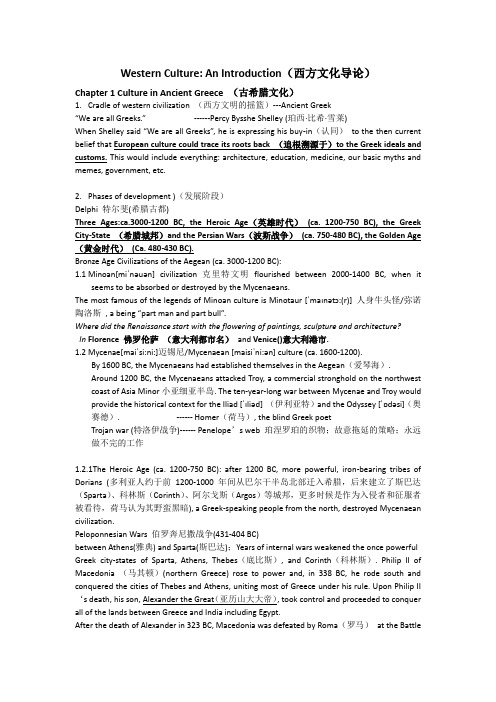
Western Culture: An Introduction(西方文化导论)Chapter 1 Culture in Ancient Greece (古希腊文化)1.Cradle of western civilization (西方文明的摇篮)---Ancient Greek“We are all Greeks.”------Percy Bysshe Shelley (珀西·比希·雪莱)When Shelley said “We are all Greeks”, he is expressing his buy-in(认同)to the then current belief that European culture could trace its roots back (追根溯源于)to the Greek ideals and customs. This would include everything: architecture, education, medicine, our basic myths and memes, government, etc.2.Phases of development )(发展阶段)Delphi 特尔斐(希腊古都)Three Ages:ca.3000-1200 BC, the Heroic Age(英雄时代)(ca. 1200-750 BC), the Greek City-State (希腊城邦)and the Persian Wars(波斯战争)(ca. 750-480 BC), the Golden Age (黄金时代)(Ca. 480-430 BC).Bronze Age Civilizations of the Aegean (ca. 3000-1200 BC):1.1Minoan[miˈnəuən] civilization 克里特文明flourished between 2000-1400 BC, when itseems to be absorbed or destroyed by the Mycenaeans.The most famous of the leg ends of Minoan culture is Minotaur [ˈmaɪnətɔ:(r)] 人身牛头怪/弥诺陶洛斯, a being “part man and part bull”.Where did the Renaissance start with the flowering of paintings, sculpture and architecture?In Florence 佛罗伦萨(意大利都市名)and Venice()意大利港市.1.2Mycenae[maiˈsi:ni:]迈锡尼/Mycenaean [maisiˈni:ən] culture (ca. 1600-1200).By 1600 BC, the Mycenaeans had established themselves in the Aegean(爱琴海).Around 1200 BC, the Mycenaeans attacked Troy, a commercial stronghold on the northwest coast of Asia Minor小亚细亚半岛. The ten-year-long war between Mycenae and Troy would provide the historical context for the Iliad [ˈɪliəd] (伊利亚特)and the Odyssey [ˈɒdəsi](奥赛德). ------ Homer(荷马), the blind Greek poetTrojan war (特洛伊战争)------ Penelope’s web 珀涅罗珀的织物;故意拖延的策略;永远做不完的工作1.2.1The Heroic Age (ca. 1200-750 BC): after 1200 BC, more powerful, iron-bearing tribes of Dorians (多利亚人约于前1200-1000年间从巴尔干半岛北部迁入希腊,后来建立了斯巴达(Sparta)、科林斯(Corinth)、阿尔戈斯(Argos)等城邦,更多时候是作为入侵者和征服者被看待,荷马认为其野蛮黑暗), a Greek-speaking people from the north, destroyed Mycenaean civilization.Peloponnesian Wars 伯罗奔尼撒战争(431-404 BC)between Athens(雅典) and Sparta(斯巴达);Years of internal wars weakened the once powerful Greek city-states of Sparta, Athens, Thebes(底比斯), and Corinth(科林斯). Philip II of Macedonia (马其顿)(northern Greece) rose to power and, in 338 BC, he rode south and conquered the cities of Thebes and Athens, uniting most of Greece under his rule. Upon Philip II ‘s death, his son, Alexander the Great(亚历山大大帝), took control and proceeded to conquer all of the lands between Greece and India including Egypt.After the death of Alexander in 323 BC, Macedonia was defeated by Roma(罗马)at the Battleof Cynoscephalae(基诺斯山战役)in 197 BC and then again at the Battle of Pydna(皮德纳战役)in 168 BC. The Greeks were finally defeated at the Battle of Corinth in 146 BC. Rome completely destroyed and plundered(掠夺)the city of Corinth as an example to other Greek cities.1.2.2The Greek City-State and the Persian Wars (ca. 750-480 BC)In 490 BC, Battle of Marathon 马拉松战役In 480 BC, Battle of the Hot Gates and Battle of Salamis 萨拉米斯海战Persian Wars(希波战争): Herodotus 希罗多德(ca. 485-425 BC), the father of history 历史之父。
西方文化导论Unit.pptx
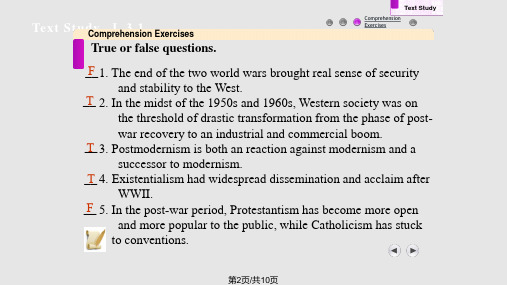
_F_ Press de France Nouvelle.
5. Jazz was initially influenced by two kinds of Negro music: ragtime and blues.
_T_
第8页/共10页
Text Study
Text Study _4_3333 Comprehension Exercises
Text Study
Comprehension Exercises
Multiple choice.
(1) Impressionism got its name from ________famous painting Impression: Sunrise.
A. Pissarro’s B. Monet’s C. van Gogh’s D. Paul Gauguin’s
Hofmann, who benefited from the movements like cubism,
_fa_u_v_i_s_m_ and expressionism.
3. Action painting is a branch of a_b_s_t_ra_c_t_e_x_p_r_e_s_s_io_n_is_m__ .
Comprehension Exercises
Fill in the blanks.
1. _N_e_w__Y_o_rk__ became a new centre of world art during and after
the WWII, taking over from Paris.
2. One of the representative of abstract expressionism is Hans
《西方文化导论》(Quiz)精品PPT课件

(3) Mycenaean culture was influenced the most by Cretan culture on ____. A. farming
B. handicraft and trade
C. religion
D. philosophy
(4) The Trojan War broke out at the end of ____.
Unit 4
Text StuMdyu_IlVtthe Christian Church was divided into the Roman Catholic Church and the Eastern Orthodox Church. A. In 1054
D. Oxford
(4) The medieval civilization met its climax during the _________. A. 14th century
B. 13th century
C. 12th century
D. 11th century
(5) Which of the following is not the inspiration for the Renaissance? A. The break-up of feudal structures.
Text Study _6_5 _F_ (5) In medieval society, God permanently served as an image of severity and solemnity, without change until the
renaissance.
Unit 6
Unit 5
TruTeexotrSftaudlsye_q6u_e5stions.
西方文化导论Unit7

(1) Henry Fielding (2) Jonathan Swift (3) Daniel Defoe (4) John Bunyan (5) John Milton
a. Paradise Lost b. Robinson Crusoe c. Gulliver’s Travels d. Pilgrim’s Progress e. Tom Jones
_T_ (2) The late Renaissance focused on the metaphysical and rationalist philosophy, while the Enlightenment was based on epistemology and empiricism.
_T_ (5) Hume’s empiricist philosophy greatly influenced Immanuel Kant’s critical philosophy.
Comprehension Exercises
Multiple choice.
Text Study
Comprehension Exercises
_T_ (4) The Enlightenment laid an ideological foundation for the breakout of the French Revolution.
_T_ (5) The Enlightenment unveiled the inauguration of the modern era and laid a solid foundation for the later process of the Western modernization.
Unit7西方文化导论

Get Started
The foremost figures in the Enlightenment were a group of French thinkers known as philosophers. The preeminent member of this group was the writer, historian, and poet Voltaire. He emerged as the Enlightenment’s chief critic of contemporary culture and religion. Another important member of this group was Jean Jacques Rousseau, whose writings greatly influenced the political thinking of the time. Also influential were the writings of Charles, Baron de Montesquieu, who challenged the idea of rule by a monarch and championed individual freedom. The philosopher Denis Diderot, in collaboration with Jean D’Alembert, planned and edited a multivolume encyclopedia designed to include all realms of knowledge. Many of the entries were written by other philosophies.
Unit7Westernculture
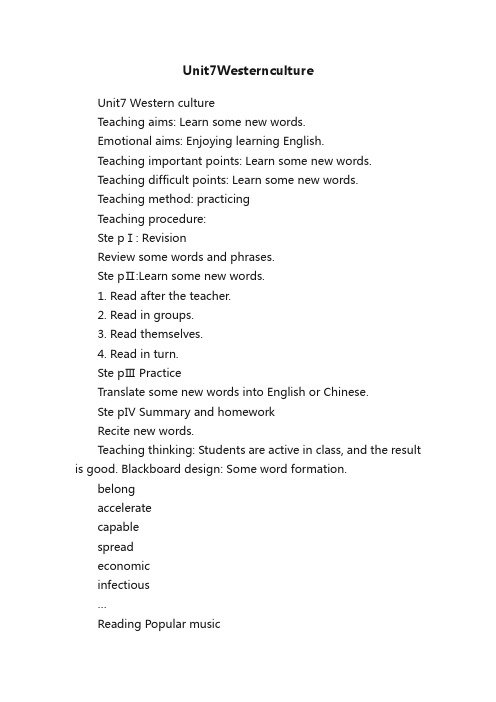
Unit7WesterncultureUnit7 Western cultureTeaching aims: Learn some new words.Emotional aims: Enjoying learning English.Teaching important points: Learn some new words.Teaching difficult points: Learn some new words.Teaching method: practicingTeaching procedure:Ste pⅠ: RevisionReview some words and phrases.Ste pⅡ:Learn some new words.1. Read after the teacher.2. Read in groups.3. Read themselves.4. Read in turn.Ste pⅢ P racticeTranslate some new words into English or Chinese.Ste pⅣ Summary and homeworkRecite new words.Teaching thinking: Students are active in class, and the result is good. Blackboard design: Some word formation.belongacceleratecapablespreadeconomicinfectious…Reading Popular musicTeaching aims: 掌握Key words 和Useful expressions的基本用法.Emotional aims: 了解流行音乐.Teaching important points: 理解课文内容,掌握课文的主要知识点.Teaching difficult points: 掌握Key words 和Useful expressions的基本用法.Teaching method: Teaching and practicing.Teaching procedures:Ste pⅠRevision检查学生预习生词和短语的情况.Ste pⅡ1.1.组织讨论Warm up中的3个问题,Do you like popular music?Do you know any western pop singers?Is singing English songs a good way of learning English?2.播放几首著名的英语流行乐曲或歌曲,回答:What kind of music did you hear just now?Can you sing an English pop song?3.讨论课文插图:Who are the four young men?约翰·列侬( John Lennon)、保罗·麦卡特尼(Paul McCartney)、乔治·哈里森( George Harrison)、斯图尔特·苏特克里弗(Stuart Sutcliffe)、彼得·贝斯特(Peter Best) What are they?4.对上述问题可给学生适当的提示,以便了解更多的信息。
西方文化导论XS106011 1.3 希腊化文化
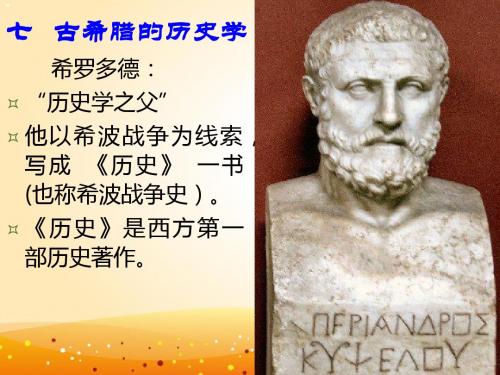
罗马诺国立博物馆
波留克列特斯
持矛者
来自意大利庞贝 约公元前450-440年 青铜原作的罗马大理石复制品 高约210.8cm
那不勒斯国立考古博物馆
菲迪亚斯名作品为
公元前 4 世纪 是希腊雕刻古典 后期,风格优美 柔和,裸体女性 成为雕刻家热衷 的主题。
马和罗得岛等地。
《萨莫色雷斯的尼开神像》
胜利女神像
《垂死的高卢人》
自杀的高卢人
(帕加马)
紧张瞬间 对比:
立与垂下、生与死、 动与静、形体的仰与 俯、正与侧转
《米洛的阿芙罗蒂德》( 通常称作《维纳斯像》)
她上身赤裸 ,起伏变化的玉 肌似丘如谷 ,臂部富有肉感 的曲线与腰际的浅涡令人消 魂,这真实得似有体温的胴 体散发出醉人的芳香 ,但仍 不失端庄典雅与崇高优美 。 整个形象给人以矜持而智慧 的亲切感,雕刻家确实创造 了一个人化了的神。
希腊雕刻古典后期
柏拉西特列斯 的杰作是《萨提儿》、《赫尔墨斯》。 列西普斯:《刮汗污的运动员》、《赫拉克勒斯》。 史柯巴斯 留下许多头像,都着力表现人物面部表情, 传达一种强烈感情,与前者风格迥异。
柏拉西特列斯 《萨提儿》 《赫尔墨斯》
《萨提儿》→
列西普斯代表作:
《刮汗污的运动员》 《赫拉克勒斯》
主要历史著作 是 《希腊史》 《远征记》和 《苏格拉底回 忆录》。
八 古希腊的建筑与雕塑
希腊古典美术贯穿着两个要素 : “自然”和“理 想”。
表现理想化的自然,便是希腊艺术的核心。
古典希腊造型艺术的形式法则就是要遵循质朴、 合理、端庄、谐调的原则。 希腊古典艺术在公元前5世纪的古典盛期时代成熟。 形成了以雅典为主要的创作中心。
英语拓展模块unit 7《western culture》ppt课件(1)

contribute……to 有助于,促使
She contributes greatly to the movie.
Fresh air contributes to good health.
establish 建立
Our school was established in 1986.
profit 利润,利益 make profits 创利润
His song is so infectious that many audience burst into tears.
The lung disease is infectious among people.
abstract 抽象的
These pictures are very abstract.
They made a big profit by selling fake goods.
continue 继续做某事
You should continue to learn English.
jazz
Grammar: infinitive or V-ing after a verb
不定式或动词ing形式 在动词后的用法
He stopped to smoke. 他停下来吸烟。
I remember locking the door. 我记得把门锁上了。 Remember to lock the door. 记着要锁门。
I forgot meet her. 我忘记去见他了。 Have you forgotten meeting her? 你忘记曾见过她了吗?
在下列动词之后可以用不定式也可以用动 词的-ing形式做宾语,在意思上区别不大。
attempt, begin, continue, fear, hate,
《西方文化》第七章
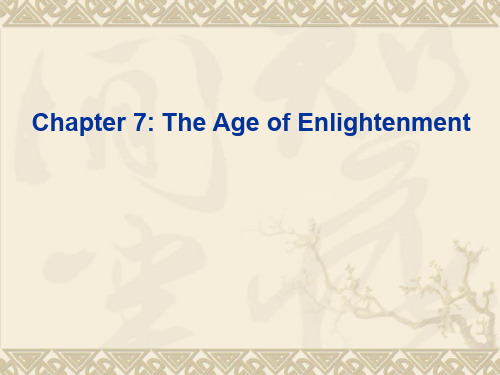
Lettres Philosophiques: written in the style of letters to friends in France, the 24 “letters” try to show a contrast between English liberty and toleration and French arbitrary government and call for political, religious and philosophic freedom.
认识。狄德罗依据唯物主义观点,提出了“美在关系”说。认为 “美”
一个存在物的名词,它标记着存在物一种共有的性质,这个共有的
性质就是“关系”。这就是“美在关系”的含义。“美在关系”就 意味着美
在事物的客观性质,事物的性质是美的根源。 Encyclopedie,Elements of Physiology(《生理学的基础》),
《西方文化导论》(Quiz)

(3) ____was the first emperor in Roman Empire from 27 BC to 14 AD.
A. Caesar
B. Octavian C. Remus D. Pompey
(P.32-33)
(4) The First Triumvirate consisted of ____. A. Julius Caesar, Mark Antony, Sulla B. Pompey, Crassus, Cleopatra C. Pompey, Crassus, Julius Caesar D. Octavian, Brutus, Marius
In history, Israelite monarchy prospered with the three kings, Saul, ____. A. David and Solomon B. Moses and David C. Jacob and David D. Jacob and Solomon
D. Free Churches
Unit 5
Text True orStudy false _6_5 questions. __ F (1) Since the medieval culture retarded during almost 1000 years development, this period never enhanced Western human civilization in history. __ T (2 three parts after Charlemagne’s death signified the weakening of the centralized system. __ T (3) The spirit of the Goths formed one part of the central features of the Christian Trinity. __ T (4) The hierarchical levels of the priesthood during Medieval Ages begin with the Pope as supreme leader, followed by cardinals, archbishops, bishops and the parish priest.
西方礼仪文化unit 7

7. Dress for Success
By the time we meet and converse, we have already spoken to each other in an older more universal tongue. — Allison Lurie, Author of The Language of Clothes
• • • • • • • Confident posture Eye contact Minimal body movement Clothes are clean, unrumpled, and stain-free Shoes are clean and polished Fingernails are clean (for women, no chipped polish) Pleasant expression
Is business etiquette important?
"Etiquette would not seem to play an important part in business, and yet no man can ever tell when its knowledge may be of advantage, or its lack may turn the scale against him." — Emily Post
Consider Your Work Environment Strive for Consistency Ask First, Dress Later Dress to Impress Professional Comfortable Clean
8. Addressing others with respect
西方文化导论课后题答案7-11章
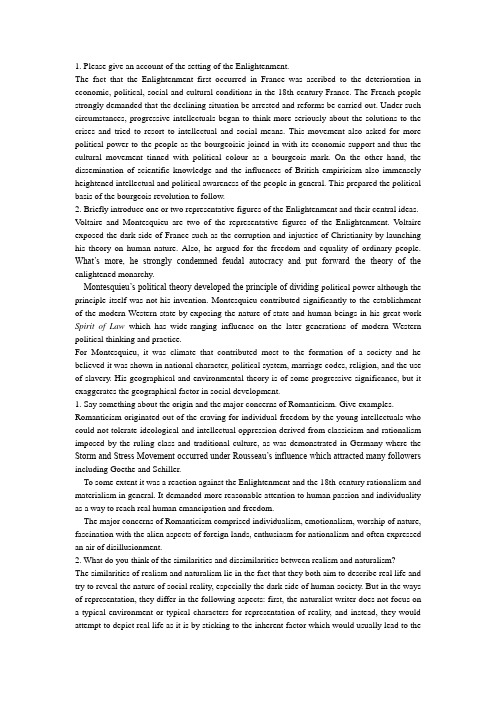
1. Please give an account of the setting of the Enlightenment.The fact that the Enlightenment first occurred in France was ascribed to the deterioration in economic, political, social and cultural conditions in the 18th-century France. The French people strongly demanded that the declining situation be arrested and reforms be carried out. Under such circumstances, progressive intellectuals began to think more seriously about the solutions to the crises and tried to resort to intellectual and social means. This movement also asked for more political power to the people as the bourgeoisie joined in with its economic support and thus the cultural movement tinned with political colour as a bourgeois mark. On the other hand, the dissemination of scientific knowledge and the influences of British empiricism also immensely heightened intellectual and political awareness of the people in general. This prepared the political basis of the bourgeois revolution to follow.2. Briefly introduce one or two representative figures of the Enlightenment and their central ideas. V oltaire and Montesquieu are two of the representative figures of the Enlightenment. Voltaire exposed the dark side of France such as the corruption and injustice of Christianity by launching his theory on human nature. Also, he argued for the freedom and equality of ordinary people. What’s more, he strongly condemned feudal autocracy and put forward the theory of the enlightened monarchy.Montesquieu’s political theory developed the principle of dividing political power although the principle itself was not his invention. Montesquieu contributed significantly to the establishment of the modern Western state by exposing the nature of state and human beings in his great work Spirit of Law which has wide-ranging influence on the later generations of modern Western political thinking and practice.For Montesquieu, it was climate that contributed most to the formation of a society and he believed it was shown in national character, political system, marriage codes, religion, and the use of slavery. His geographical and environmental theory is of some progressive significance, but it exaggerates the geographical factor in social development.1. Say something about the origin and the major concerns of Romanticism. Give examples. Romanticism originated out of the craving for individual freedom by the young intellectuals who could not tolerate ideological and intellectual oppression derived from classicism and rationalism imposed by the ruling class and traditional culture, as was demonstrated in Germany where the Storm and Stress Movement occurred under Rousseau’s influence which attracted many followers including Goethe and Schiller.To some extent it was a reaction against the Enlightenment and the 18th-century rationalism and materialism in general. It demanded more reasonable attention to human passion and individuality as a way to reach real human emancipation and freedom.The major concerns of Romanticism comprised individualism, emotionalism, worship of nature, fascination with the alien aspects of foreign lands, enthusiasm for nationalism and often expressed an air of disillusionment.2. What do you think of the similarities and dissimilarities between realism and naturalism?The similarities of realism and naturalism lie in the fact that they both aim to describe real life and try to reveal the nature of social reality, especially the dark side of human society. But in the ways of representation, they differ in the following aspects: first, the naturalist writer does not focus on a typical environment or typical characters for representation of reality, and instead, they would attempt to depict real life as it is by sticking to the inherent factor which would usually lead to thecause or motivation of certain or behaviors; second, the naturalist writer emphasizes more of the influence of environment on human nature and behavior by exposing the dark and evil aspect of human society which is not just similar to social realism but even more violent and barbarous and emotional.1.2. Choose one representative character from German classical philosophers and make a brief remark on his contribution to the later social or cultural development.Immanuel Kant was an 18th-century German classical philosopher. He is regarded as one of the most influential thinkers of modern Europe and of the late Enlightenment. Kant created a new widespread perspective in philosophy which influenced European philosophy through and after his lifetime. He also published important works of epistemology, as well as works relevant to religion, law, and history. His most important works is the Critique of Pure Reason, an investigation into the limitations and structure of reason itself. It encompasses an attack on traditional metaphysics and e pistemology, and highlights Kant’s own contribution to these areas. Kant’s great contribution lies in his interpretation of human epistemology: the ultimate nature of reality of the “things in themselves” remains forever unaccessible to the human mind and what we can know is only its phenomena. The mind impresses its forms of sensibility via space and time or the original data of the senses and orders them according to the categories of thought.1. Say something you know about Modernism, including its performance and features. Modernism, in its broadest sense, is modern thought, character, or practice. More specifically, the term describes both a set of cultural tendencies and an array of associated cultural schools, originally arising from wide-scale and far-reaching changes in Western society in the late nineteenth and early twentieth centuries. The term encompasses the activities and output of those who felt the “traditional” forms of art, architecture, literature, religious faith, social conventions and daily life were becoming outdated in the new conditions of economic, social and political developments under the influence of industrialization and colonization.Modernism —despite its complexity and multiplicity in terms of ideological tendencies and representation modes, could be regarded basically to be irrational, that is, in opposition to rational tradition of the Western culture and civilization. History has repeatedly proved that any radical drive or trend could not last long and so did modernism which, with all its justifications, only survived a few decades since its beginning and had to decline and finally disappeared as a movement though some of its ideas and forms or techniques still maintained. The reason is simple — no one could reject all the inheritances his ancestors have passed on to him no matter whether these inheritances are valuable enough for him to benefit from. In that sense people after modernism, particularly the cultural people or intellectuals, have to take a lesson from Modernist Movement, which they should be cautious about the way to handle cultural heritage and need to try to make use of the positive elements from tradition.2. Describe one or two modernist writers focused on his work.James Joyce is one of most prominent modernist writers in the early 20th century whose reputation mainly rests upon his masterful use of the Stream of Consciousness technique in his writing. He is best known for his landmark novel Ulysses (1922) and its controversial successor Finnegans Wake(1939), as well as the short story collection Dubliners(1914) and the semi-autobiographical novellet A Portrait of the Artist as a Young Man (1916). Ulysses is one of the most important works of Modernist literature. The action of novel, which takes place in asingle day, 16 June 1904, sets the characters and incidents of the Odyssey of Homer in modern Dublin and bases his three protagonists, Leopold Bloom, Molly Bloom and Stephen Dedalus, on the triangular relationship in parallel with the construction of Odysseus, Penelope and Telemachus. Ulysses’ stream-of-consciousness technique, symbolic structure, and experimental prose style—full of puns, parodies, and allusions—as well as its rich characterization in close association with serious thematic concerns, such as Irish nationalism, sympathy for the Jew and women, and protest against Catholicism, therefore renders the book a highly recognized status in Modernist literature.1. Tell some ideological Representative Figures of the Modern age and their main ideas..(1) Marx’s Marxism, its main ideas include scientific socialism, political economics, and dialectic materialism.(2) Darwin’s theory of Evolution by Natural Selection, Its main idea as follow:i. Species have developed or evolved by a series of small variations.ii. All animals and plants are descended from a single prototype.iii. Natural selection or survival of the fittest ensures that only those variations which improve the chances of survival of species are ultimately significant.iv. Only inherited characteristics can be passed on to later generations.Comet’s Positivism, including Theory of Three Stages:i. Man wanted to acquire absolute knowledge and explain the observed phenomena of the outside world with the help of supernatural theological influences.ii. Man used instead a kind of personified abstraction, i.e. metaphysical nature and “natural force”. iii. Rational sciences dominated everything.Bergson’s Intuitional Ideas:i. He was opposed to the monism of both materialism and idealism and sought a return to philosophical dualism.ii. The functions of intuition and intellect and their differences.Freud’s Theory of Psychoanalysis:i. deep-level psychology: the human unconscious was like the submerged part of an iceberg, hiding many instinctive impulses and repressed desires;ii. Three concepts: the id, the ego, the superego (choose two or three)。
西方文化导论(英文)
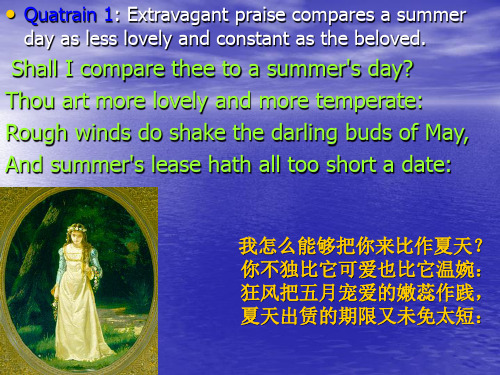
Comments on Leaves of Grass
• 1). Nature’s beauty uplifts the human spirit(line
•
•
15, 23,24 specially refer to this theme).The nature stimulate the mind of human and give them relaxing and satifatory feeling. 2). People sometimes fail to appreciate nature’s wonders as they go about their routines(17 &18) 3). Nature thrives unattended. The daffodils proliferate in splendor along the shore of the lake without the need of the human attention
2. What does “wander” mean?
Questions about the theme
3. Why do you think the poet chooses to personify daffodils in the poem?
4. What is the relation between the poet and daffodils as described in the poem? 5. What’s the function of nature?
The theme
• The poem was about nature and
describing the great power of nature which may influence our life deeply as revealed in the poem. There is not only the visual effect but also the emotional response . • The choose of the word “lonely” in “I wandered lonely as a cloud” instead of other words like carefree, leisure or jolly convey to us the poet’s depression and disconsolateness悲伤 at the very beginning.
西方文化导论chapter
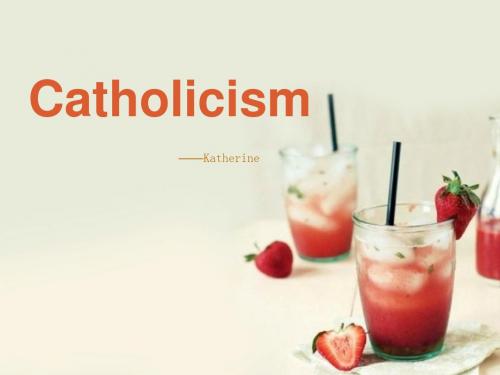
Easter
Pentecost
圣神降临节
Assumption
圣母升天节
Dogma(教理)
Decalogue(天主十诫) 第一诫 钦崇一天主在万有之上。 第二诫 不呼天主圣名以发虚誓。 第三诫 守瞻礼之日和主日。 第四诫 孝敬父母,尊敬师长。 第五诫 不杀人不害人。 第六诫 不行邪淫。 第七诫 不偷盗。 第八诫 不妄证不毁谤人。 第九诫 不贪图他人妻子 第十诫 不贪他人财物。
Catholicism
——Katherine
Three major religions in ቤተ መጻሕፍቲ ባይዱhe world
Buddhism 佛教
Christianity 基督教
Islam 伊斯兰教
Catholicism 天主教
the Eastern
Orthodoxy 东正教
Protestantism 新教
Introductions of Catholicism
The history of Catholicism
Catholicism is the one true church founded by Jesus Christ in the 1st century AD.
Need of politics, the early Christian(基督教徒) was persecuted(迫害) cruelly by Roman Emperor.
西方文化导论

The relationship of art and society, can use a metaphor to illustrate -----
the society is the source of art, and art is the social source out of a living water.
The importance of art to a society
4.Art is a great tool for learning. Art can be found in almost everywhere where there is a school. Art is fun and acts as an interactive tool for reluctant learners and younger students. they can learn to appreciate art for what it can do for them. People can learn a lot because art is almost as effective as written things.
The importance of art to a society
7.Art can show the passage of time. During parts of history, writing was not used by certain civilizations because they did not know how to use it.However, people were still able to communicate through means of art. They used art to represent things in life. This is why we understand so much about the past.
西方文化导论-复习题1-7章

Greek CultureI. Fill in the blanks:1.European culture is made up of many elements, two of these elements are considered to be more enduring and they are the Greco-Roman(希腊罗马的)element and the Judeo-Christian (犹太教与基督教的)element.2.Greek culture reached a high point of development in the 5th century.3.In the second half of the 4th century B. C., all Greece was brought under the rule of Alexander, king of Macedon.4.In 146 B. C. the Romans conquered Greece.5.Revived in 1896, the Olympic Games have become the world’s foremost amateur sports competition.6.Ancient Greeks considered Homer to be the author of their epics.7.The Homer's epics consisted of_ Iliad and Odyssey .8.The Iliad deals with the alliance of the states of the southern mainland of Greece, led by Agamemnon in their war against the city of Troy.9.The Odyssey deals with the return of Odysseus after the Trojan war to his home, island of Ithaca.10.The representation form of Greek Democracy is __ citizen-assembly._(公民大会)11.Of the many lyric poets of ancient Greece, two are still admired by readers today: Sappho and Pindar.12.Sappho was considered the most important lyric poet of ancient Greece.13.Pindar is best known for his odes celebrating the victories at the athletic games, such as the 14 Olympic odes.14.The three great tragic dramatists of ancient Greece are Aeschylus, Sophocles, and Euripides.15.Aeschylus wrote such plays as Prometheus Bound, Persians and Agamemnon.16.Sophocles wrote such tragic plays as Oedipus the King(俄狄浦斯王), Electra(伊莱克特拉(谋杀其母及其情人者), and Antigone.Oedipus complex(恋母情结)and Electra complex(恋父情结) derived from Sophocles’ plays.17.Euripides(欧里庇得斯)wrote mainly about women in such plays as Andromache, Media, and Trojan Women.edy also flourished in the 5th century B. C.. Its best writer was Aristophanes, who has left eleven plays, including Frogs, Clouds,Wasps and Birds.19.Euripides _ is the first writer of "problem plays".20.Herodotus(希罗多德)is often called “Father of History”. He wrote about the wars between Greeks and Persians.21.Thucydides(修西得底斯)described the war between Athens and Sparta and between Athens and Syracuse, a Greek state on the Island ofSicily.22.Pythagoras(毕达哥拉斯)was a bold thinker who had the idea that all things were numbers.23.Pythagoras was the founder of scientific mathematics.24.Heracleitus(赫拉克利特) believed fire to the primary element of the universe, out of which everything else had arisen.25.The greatest names in European philosophy are Socrates, Plato and Aristotle.26.In the 4th century B. C., four schools of philosophers often argued with each other, they are the Cynics(犬儒学派), the Sceptics(怀疑论学派), the Epicureans(伊壁鸠鲁学派), and the Stoics(斯多葛学派).27.Euclid(欧几里得) is well-known for his Elements《几何原本》, a textbook of geometry.28.To illustrate the principle of the level, Archimedes is said to have told the king: “Give me a place to stand, and I will move the world.”29.Greek architecture can be grouped into three styles: the Doric(多利安式)style which is also called the masculine style; the Ionic(爱奥尼亚式)style which is also called the feminine style; and a later style that is called the Corinthian(科林斯式)style.30.The Acropolis at Athens(雅典卫城)and the Parthenon(万神殿) are the finest monument of Greek architecture and sculpture in more than2000 years.II.Choice1.Which culture reached a high point of development in the 5th century B. C.?A. Greek CultureB. Roman CultureC. Egyptian CultureD. Chinese Culture2.In ___________ the Roman conquered Greece.A.1200B.C. B.700 B. C.C.146 B. C.D. The 5th century3.Which of the following works described the war led by Agamemnon against the city of Troy?A. Oedipus the KingB. IliadC. OdysseyD. Antigone4.Which of the following is NOT the plays written by Aeschylus?A. AntigoneB. AgamemnonC. PersiansD. Prometheus Bound5.Which of the following is NOT the plays written by Sophocles?A.ElectraB.AntigoneC.Trojan WomanD.Oedipus the King6.Which of the following is the play written by Euripides?A.Antigone B PersiansC ElectraD Medea7.Which of the following is NOT the greatest tragic dramatist of ancient Greece?A AristophanesB EuripidesC SophoclesD Aeschylus8.Who ever said that “You can not step twice into the same river”?A PythagorasB HeracleitusC Aristotle9.Who was the founder of scientific mathematics?A HeracleitusB AristotleC SocratesD Pythagoras10.Who is chiefly noted for his doctrine that “man is the measure of all things”?A ProtagorasB PythagorasC PyrrhonD EpicurusIII. Interpretation:1. PlatoPlato was a very famous philosopher of ancient Greece, pupil of Socrates. Plato built up a comprehensive system of philosophy. He argued that men have knowledge because of the existence of certain general “ideas”, like beauty, truth and goodness. Only these “ideas” are completely real, while the physical world is only relatively real. For this reason, Plato’s philosophy is called Idealism, an d Plato was called idealist.2. "Democracy" in ancient Greece1)Democracy means "exercise of power by the whole people", but in Greece by "the whole people" the Greeks meant only the adult male citizens.2) Women, children, foreigners and slaves were excluded from Democracy.IV. Questions:1. How did the Greek Culture originate and develop?1) Probably around 1200 B.C., a war was fought between Greece and troy. This is the war that Homer refers to in his epics.2) Greek culture reached a high point of development in the 5th century B.C.A. The successful repulse(击退)of the Persian invasion early in the 5th century.B. The establishment of democracy.C. The flourishing of science, philosophy, literature, art and historical writing in Athens.3) The 5th century closed with civil war between Athens and Sparta.4) In the second half of the 4th century B.C., Greece was conquered by Alexander, king of Macedon. Whenever he went and conquered, whenever Greek culture was found.5) Melting between Greek culture and Roman culture in 146 B.C., the Romans conquered Greece.2. What is the great significance of Greek Culture on the later-on cultural development?There has been an enduring excitement about classical Greek culture in Europe and elsewhere rediscovery of Greek culture played a vital part in the Renaissance in Italy and other European countries.1) Spirit of innovationThe Greek people invented mathematics and science and philosophy; They first wrote history as opposed to mere annals; They speculated freely about the nature of the world and the ends of life, without being bound in the fetters(束缚) of any inherited orthodoxy(正统的实践活动、风俗或信仰).2) Supreme AchievementThe Greeks achieved supreme achievements in nearly all fields of human endeavor: Philosophy, science, epic poetry, comedy, historical writing, architecture, etc.3) Lasting effectA. Countless writers have quoted, borrowed from and otherwise used Homer's epics, the tragedies of Aeschylus and Sophocles and Euripides, Aristophanes' comedies, Plato's Dialogues, ect.B. In the early part of the 19th century, in England alone, three young Romantic poets expressed their admiration of Greek culture in works which have themselves become classics: Byron(拜伦)'s Isles of Greece(《哀希腊》), Shelley(雪莱)'s Hellas and Prometheus Unbound (《解放了的普罗米修斯》)and Keats(济慈)'s Ode on a Grecian Urn(《希腊古瓮》).C. In the 20th century, there are Homeric parallels in the Irishman James Joyce(乔伊斯)'s modernist masterpiece Ulysses.Roman Culture 1I. Fill in the blanks.1. The burning of Corinth in 146 B. C. marked Roman conquest of Greece, which was then reduced to a province of the Roman Empire.2. The Roman writer Horace said: “Captive Greece took her rude conqueror captive”.(大意是:征服者反而被被征服者所征服。
西方文化导论(第二版)
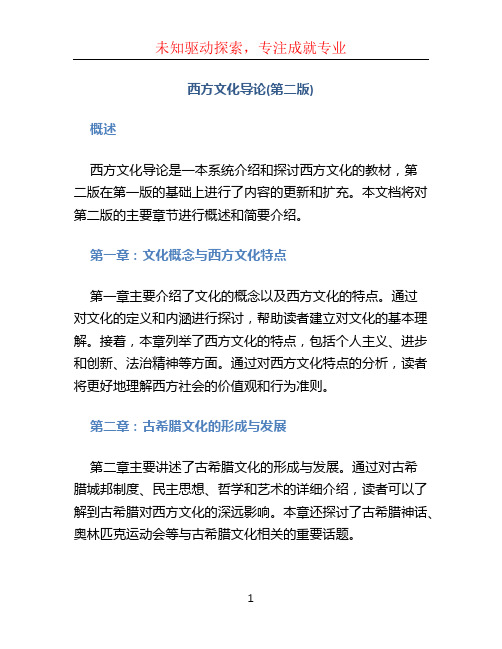
西方文化导论(第二版)概述西方文化导论是一本系统介绍和探讨西方文化的教材,第二版在第一版的基础上进行了内容的更新和扩充。
本文档将对第二版的主要章节进行概述和简要介绍。
第一章:文化概念与西方文化特点第一章主要介绍了文化的概念以及西方文化的特点。
通过对文化的定义和内涵进行探讨,帮助读者建立对文化的基本理解。
接着,本章列举了西方文化的特点,包括个人主义、进步和创新、法治精神等方面。
通过对西方文化特点的分析,读者将更好地理解西方社会的价值观和行为准则。
第二章:古希腊文化的形成与发展第二章主要讲述了古希腊文化的形成与发展。
通过对古希腊城邦制度、民主思想、哲学和艺术的详细介绍,读者可以了解到古希腊对西方文化的深远影响。
本章还探讨了古希腊神话、奥林匹克运动会等与古希腊文化相关的重要话题。
第三章:罗马文化的兴盛与衰落第三章主要介绍了罗马文化的兴盛与衰落。
通过对罗马帝国的建立、法律制度、建筑艺术等方面的讲解,读者可以了解到罗马文化的辉煌。
同时,本章还探讨了罗马帝国的衰落原因,包括内外因素的影响,为读者呈现了一个全面的罗马文化画卷。
第四章:基督教与中世纪文化第四章主要探讨了基督教与中世纪文化的关系。
通过对基督教教义、圣经、修道院制度等方面的介绍,读者可以更好地理解基督教对于西方文化的影响。
本章还讲解了中世纪文化的典型特征,包括封建制度、骑士精神等,为读者呈现了一个中世纪文化的全景图。
第五章:文艺复兴与人文主义第五章主要介绍了文艺复兴与人文主义运动。
通过对文艺复兴时期的艺术、文学、科学等方面的讲解,读者可以了解到文艺复兴对于西方文化的重要意义。
本章还探讨了人文主义的核心观点与价值观,为读者呈现了一个充满思想与创新的时代。
第六章:启蒙运动与近代西方文化第六章主要探讨了启蒙运动与近代西方文化。
通过对启蒙运动的起源、思想家以及影响的介绍,读者可以了解到启蒙运动对于近代西方文化的深刻影响。
本章还讲解了近代西方文化的主要发展特点,包括科学理性主义、人权思想等方面。
Unit 7 Western Culture

2、难点
(1)掌握并灵活运用课文中的短语,能举一反三; (2)背诵课文或用英语简要复述课文大意。
二、学情分析
1、学生学情分析 有一定的英语基础,读写听说能力较强; 对英语学习兴趣较浓; 兴趣不高,自信心不够,成绩较差。
2、本单元学情分析 主题:谈论西方文化和一些热门的文化现象。 给学生提供一些文化现象让学生讨论,教师 要不断鼓励学生,让学生勇于发表自己的真实观 点和想法,增强学生开口讲英语的自信心。
五、教学时间分配
• • • • • • • 复习提问2分钟 热身练习3分钟 听力部分8分钟 知识点讲解15分钟 练习用10分钟 最后用2分钟总结和布置作业 剩下的5分钟学生自由分配
That’s all!
Thank you very much!
2、能力目标 (1)培养学生快速阅读和理解文章大意的能力。 (2)锻炼学生听力,提高理解和熟练运用知识的能力。 3、情感目标 通过西方流行音乐的发展了解西方文化特点。
(三)教学重点及难点的确定
1、重点
(1) 学习并掌握课文中的New Words and Expression的用 法,如: belong to、be capable of 、start with 、It’s no wonder that等。 (2)在自读课文的基础上理解课文大意。 (3)训练学生通过听说读练习提高自己的 听力、口语水平和快速阅读能力。
(二)教学目标的确定
1、语言目标 (1)语言功能 会用简单的语言谈论某种热门文化现象。 (2)知识目标 词汇:belong to、revolution、romanticism、 Beatle、demand、 be capable of、 economic等。 句型:It’s no wonder that …。
西方文化导论-课后习题答案(新)
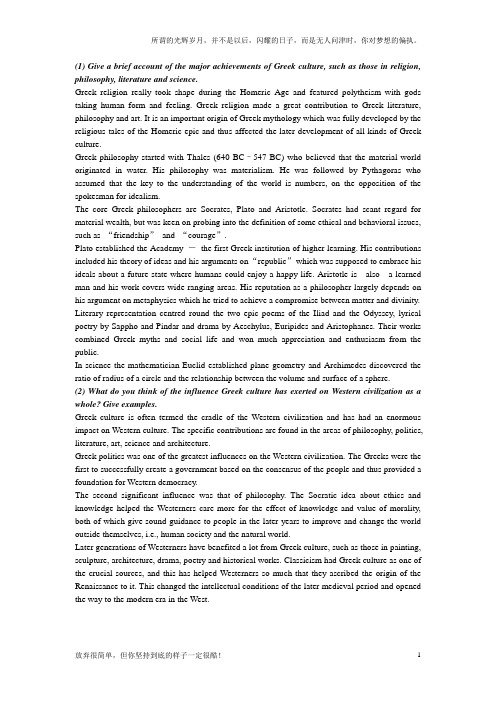
(1) Give a brief account of the major achievements of Greek culture, such as those in religion, philosophy, literature and science.Greek religion really took shape during the Homeric Age and featured polytheism with gods taking human form and feeling. Greek religion made a great contribution to Greek literature, philosophy and art. It is an important origin of Greek mythology which was fully developed by the religious tales of the Homeric epic and thus affected the later development of all kinds of Greek culture.Greek philosophy started with Thales (640 BC–547 BC) who believed that the material world originated in water. His philosophy was materialism. He was followed by Pythagoras who assumed that the key to the understanding of the world is numbers, on the opposition of the spokesman for idealism.The core Greek philosophers are Socrates, Plato and Aristotle. Socrates had scant regard for material wealth, but was keen on probing into the definition of some ethical and behavioral issues, such as “friendship”and “courage”.Plato established the Academy -the first Greek institution of higher learning. His contributions included his theory of ideas and his arguments on “republic”which was supposed to embrace his ideals about a future state where humans could enjoy a happy life. Aristotle is also a learned man and his work covers wide-ranging areas. His reputation as a philosopher largely depends on his argument on metaphysics which he tried to achieve a compromise between matter and divinity. Literary representation centred round the two epic poems of the Iliad and the Odyssey, lyrical poetry by Sappho and Pindar and drama by Aeschylus, Euripides and Aristophanes. Their works combined Greek myths and social life and won much appreciation and enthusiasm from the public.In science the mathematician Euclid established plane geometry and Archimedes discovered the ratio of radius of a circle and the relationship between the volume and surface of a sphere.(2) What do you think of the influence Greek culture has exerted on Western civilization as a whole? Give examples.Greek culture is often termed the cradle of the Western civilization and has had an enormous impact on Western culture. The specific contributions are found in the areas of philosophy, politics, literature, art, science and architecture.Greek politics was one of the greatest influences on the Western civilization. The Greeks were the first to successfully create a government based on the consensus of the people and thus provided a foundation for Western democracy.The second significant influence was that of philosophy. The Socratic idea about ethics and knowledge helped the Westerners care more for the effect of knowledge and value of morality, both of which give sound guidance to people in the later years to improve and change the world outside themselves, i.e., human society and the natural world.Later generations of Westerners have benefited a lot from Greek culture, such as those in painting, sculpture, architecture, drama, poetry and historical works. Classicism had Greek culture as one of the crucial sources, and this has helped Westerners so much that they ascribed the origin of the Renaissance to it. This changed the intellectual conditions of the later medieval period and opened the way to the modern era in the West.Chapter 21. Tell briefly the major characteristics and contributions of Roman culture, as are demonstrated in religion, poetry, history and architecture.In the early period, Roman culture often depended heavily on the introduction and imitation of other cultures, particularly, Greek culture. Thus Romans created their own powerful culture, laying the foundation for subsequent Western culture in many fields. According to Greek culture and others’ culture; they created their own gods and myth, In poetry, ancient Rome made brilliant achievements,Livy was responsible for the great History of Rome in 142 volumes. His work has always been cited by later statesmen, writers or scholars,The architecture of Ancient Rome adopted the Greek style for its own purposes, but the Romans also developed a new kind.2. In what sense do you think Roman culture owed its accomplishments to the benefits obtained from Greek culture? Give examples.Roman culture learned and inherited a lot from Greek culture.,religion, philosophy and literature. In religion, Rome had its own system of beliefs which had been simple and could hardly compare with the plurality of Greek religion. The same is true of Roman philosophy where we could find examples ,In literature, Roman men of letters also borrowed a All in all, the two cultures are closely linkedgreat deal from Greek culture.Chapter 31. How was the Jewish civilization developed after a tortuous history of split and unification? The major explanation for the development of the Jewish civilization is its strong cohesiveness and vitality,they put into effect their Judaist beliefs and what they read of Judaist scriptures.From then on Jews have begun to become aware of the necessicity to liberate themselves from the restrictive laws and acquire new knowledge and modern ideas from the Europeans, Most of Jews thus received a good education, fully armed with cultural and scientific knowledge and did well in their own position they could quickly turn it into a well developed nation in spite of its small size and small population .2.Say something about Judaism and The Old Testament.The Old Testament is the Judaist Bible. It was written in Hebrew, including the three parts:Pentateuch, Prophets and Hagiographa and Apocrypha. After The Old Testament was translated into Greek by Jewish scholars,many westerners began to understand Judaism by reading this book. It is not only of religious value but also of literatry value.Chapter 41. What are the main components of Christianity and why could it be accepted as the official religion first by the Roman Empire and then by the following kingdoms or empires in Europe?(1)The main components of Christianity are :1) The Bible as the only Christian scripture;Major Christian doctrines about Trinity and Redemption;3) Other doctrines or events of Christianity:(2 )Christianity is accepted and popular in Europe because of these factors:1).For the common people in the empire ,they needed something to fill up their spiritual vacuum. Christianity could play such a role.2). It could work together with any secular regimes to offer necessary assistance.3). The name and influence of Christiaity would be a symbol of sacredness and justification,4) Christianity is also a kind of culture, it could be tolerated because their life and propertycould thus be secured in the changed circumstances.2. What are the basic differences between Christianity and Judaism?In spite of the fact that the two religions derived from Jewish culture, there are some basic differences between them.First is the different image of God.Second is different view of God. Jehovah is viewed He is like fire or wind .God is kinder and more helpful, Third is the different position each religion is located in and hence would make different contribution. Fourth is Jehovah was important to Jews only in theory and affect them in spirit occasionally while Christianity moved into secular life for the Westerner as Pope and churches became very powerful .Chapter 61.Tell simply the background and development of the Renaissance.It was no accident that it first occurred in Florence and Italy where the early signs of capitalism had appeared at the same time as social chaos, political disputes and military clashes , more and more people began to suspect the justification for those who held the power,Painting and sculpture were the first area to reflect the change of subjects and tastes.(2) What are the major features and achievements of the Renaissance? Give examples.The Renaissance is characterised by seeking ideological emancipation, intellectual freedom and political awareness, based on cultural production and religious reformation. All these were undertaken or unfolded gradually but widely, extending its influences to every corner of Europe, with more and more people getting involved.The achievements were seen principally in six areas, namely, painting, sculpture, poetry, fiction, drama and religious reformation as well as the change in the cultural and intellectual climate. Instances could be located in these areas, such as the huge change of subjects and styles in painting. The medieval painting used to centre on depicting Jesus Christ and other Christian subjects, not only effecting similar and the limited subject matter, but also depicting stylistically facial expressions and manners. The great artists in the Renaissance started to focus on the images with individualistic temperament, highlighting humanity instead of divinity, thus breaking away from the medieval frozen models and linking classicalism with human nature as the centre of their representational work.。
- 1、下载文档前请自行甄别文档内容的完整性,平台不提供额外的编辑、内容补充、找答案等附加服务。
- 2、"仅部分预览"的文档,不可在线预览部分如存在完整性等问题,可反馈申请退款(可完整预览的文档不适用该条件!)。
- 3、如文档侵犯您的权益,请联系客服反馈,我们会尽快为您处理(人工客服工作时间:9:00-18:30)。
(3) Daniel Defoe
(4) John Bunyan (5) John Milton
c. Gulliver’s Travels
d. Pilgrim’s Progress e. Tom Jones
Text Study
Comprehension Exercises
Comprehension Exercises
Text Study
Comprehension Exercises
Comprehension Exercises
True or false questions. T (1) Locke rejects the idea of innate knowledge and argues __ for the acquisition of knowledge from the senses. T (2) The late Renaissance focused on the metaphysical and __ rationalist philosophy, while the Enlightenment was based on epistemology and empiricism. F (3) Locke rejected the division of legislative power and __ administrative power. T (4) Berkeley was the father of a philosophical school called __ phenomenalism. T (5) Hume’s empiricist philosophy greatly influenced __ Immanuel Kant’s critical philosophy.
Get Started
Text Study
Supplementary Resources
Text Study
Interpretation of Cultural Terms
Interpretation of Cultural Terms
Immanuel Kant 康 德 (1724– 1804): An 18th-century German philosopher. He is regarded as one of the most influential thinkers of modern Europe and of the late Enlightenment.
Text Study
Comprehension Exercises
Comprehension Exercises
Multiple choice.
(1) Which of the following philosophers first put forward the idea of the division of power?
A. David Hume. B. John Locke. C. George Berkeley. D. Voltaire.
Text Study
Comprehension Exercises
Comprehension Exercise
Multiple choice. (2) The French Declaration of Human Rights and the American Declaration of Independence owed much of their sources and inspiration to _________Spirit of Laws(1748). A. Montesquieu’s B. Voltaire’s C. Rousseau’s D. Diderot’s
Text Study
Comprehension Exercises
Comprehension Exercise
Multiple choice.
(5) The Enlightenment is not opposed to____________. A. superstition
B. feudalism
Text Study
Comprehension Exercises
Comprehension Exercise
Multiple choice. (4) Rousseau is famous for his idea of _________. A. the divine right of the king B. the social contract C. the divine right of the human beings D. empiricism
Text Study
Comprehension Exercises
Comprehension Exercise
Multiple choice. (3) Montesquieu’s theory of the division of power divides the political authority into_________. A. legislative, administrative and judicial powers B. legislative, executive and judicial powers C. legislative, executive and electoral powers D. legislative, executive and law enforcement powers
C. rationalism
D. absolutism
Text Study
Comprehension Exercises
Comprehension Exercises
Match the following English writers with their works.
(1) Henry Fielding (2) Jonathan Swift a. Paradise Lost b. Robinson Crusoe
Text Study
ehension Exercises
Comprehension Exercises
Fill in the blanks. (1) The Enlightenment first started in ______ France . (2) In the 17th century, France became more powerful in economic and military achievements due to the measures and reforms taken by _________ Louis XIV . (3) In ____ 18th century, France lost its initial domination at the sea to England. (4) The Enlightenment was influenced by British __________ empiricism and dissemination of _________________ scientific knowledge . (5) With the worsening situation of France in 18th century, more and more people, led by newly emerging __________ Bourgeoisie strongly demanded for political reforms. ,
True or false questions. T (1) The Enlightenment is characterized by reason, which is a __ critical tool allowing man to get rid of prejudice and change the world, dominating nature through science. F (2) The Enlightenment overcame the prejudice against __ female, and regarded both genders as equal in the society. F (3) The major agents of change in the arts, governments and __ economy were enlightened kings and priests. T (4) The Enlightenment laid an ideological foundation for the __ breakout of the French Revolution. __ T (5) The Enlightenment unveiled the inauguration of the modern era and laid a solid foundation for the later process of the Western modernization.
